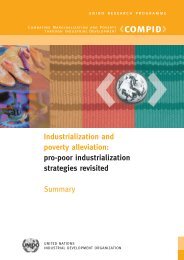Manual on the Development of Cleaner Production Policies ... - Unido
Manual on the Development of Cleaner Production Policies ... - Unido
Manual on the Development of Cleaner Production Policies ... - Unido
Create successful ePaper yourself
Turn your PDF publications into a flip-book with our unique Google optimized e-Paper software.
DEVELOPMENT OF CP POLICY<br />
MODULE 4: POLICY TOOLS AND INSTRUMENTS<br />
In <strong>the</strong> purchasing c<strong>on</strong>diti<strong>on</strong>s specified in public tender announcements, <strong>the</strong> Government (or,<br />
alternatively, local authorities) may indicate a preference for cleaner technologies or products (e.g.<br />
n<strong>on</strong>-chlorine paper, Energy Star computers and m<strong>on</strong>itors, etc.) In <strong>the</strong> Ne<strong>the</strong>rlands, for example,<br />
several governmental organizati<strong>on</strong>s incorporated preventive envir<strong>on</strong>mental management plans into<br />
public tender announcements, including <strong>the</strong> purchase <strong>of</strong> energy-efficient equipment, n<strong>on</strong>-chlorine<br />
paper, “green” public transport and electric cars.<br />
EXAMPLE<br />
Energy Star Office Equipment Programme. This volunteer initiative promotes energy efficiency<br />
through <strong>the</strong> investment in, and development <strong>of</strong>, energy-efficient and energy-saving <strong>of</strong>fice equipment.<br />
The programme distinguishes <strong>of</strong>fice equipment that meets specificati<strong>on</strong>s set by <strong>the</strong> EPA with <strong>the</strong><br />
Energy Star label. This label enables customers to easily identify those products that provide <strong>the</strong> most<br />
efficient systems.<br />
http://www.unepie.org/pc/sustain/design/green-proc.htm<br />
http://www.buygreen.com<br />
SLIDE: Ec<strong>on</strong>omic instruments—taxes<br />
• Argentina: reducti<strong>on</strong> <strong>of</strong> waste generati<strong>on</strong> taxes for companies with a<br />
recycling programme;<br />
• Mexico: envir<strong>on</strong>mental taxes <strong>on</strong> gasoline depending <strong>on</strong> <strong>the</strong> lead c<strong>on</strong>tent;<br />
• Argentina: favourable taxes to promote <strong>the</strong> use <strong>of</strong> natural gas instead <strong>of</strong><br />
gasoline;<br />
• Lithuania: accelerated depreciati<strong>on</strong>;<br />
• Belgium: eco-tax <strong>on</strong> beer if <strong>the</strong> producer does not use to 95 per cent<br />
recycled bottles/packaging.<br />
<br />
This slide <strong>of</strong>fers c<strong>on</strong>crete examples <strong>of</strong> <strong>the</strong> most comm<strong>on</strong>ly used ec<strong>on</strong>omic<br />
instruments, i.e., envir<strong>on</strong>mental taxes.<br />
Background<br />
Tax exempti<strong>on</strong>s and allowances are <strong>the</strong> most widely used ec<strong>on</strong>omic instruments. There are a number<br />
<strong>of</strong> different envir<strong>on</strong>mental charges and taxes, some <strong>of</strong> which have been discussed above in <strong>the</strong> secti<strong>on</strong><br />
<strong>on</strong> emissi<strong>on</strong> fees and n<strong>on</strong>-compliance fines. Systems based <strong>on</strong> fees and tariffs are widely used,<br />
although it should be noted that many instruments <strong>of</strong> this kind were c<strong>on</strong>ceived to support overall<br />
ec<strong>on</strong>omic policies and collect resources, ra<strong>the</strong>r than for <strong>the</strong> purpose <strong>of</strong> envir<strong>on</strong>mental management.<br />
A useful distincti<strong>on</strong> between different kinds <strong>of</strong> envir<strong>on</strong>mental taxes is whe<strong>the</strong>r <strong>the</strong>y are applied to<br />
emissi<strong>on</strong>s or products. Taxes <strong>on</strong> emissi<strong>on</strong>s are payments that are directly related to <strong>the</strong> real or<br />
estimated polluti<strong>on</strong> caused, whe<strong>the</strong>r emitted into air, water or <strong>on</strong> <strong>the</strong> soil, or even as a result <strong>of</strong> <strong>the</strong><br />
generati<strong>on</strong> <strong>of</strong> noise. Taxes <strong>on</strong> products are applied to raw materials and intermediate inputs, such as<br />
fertilizers, pesticides, natural gravel and ground water, and <strong>on</strong> final c<strong>on</strong>sumer products such as<br />
batteries, disposable packaging and car tyres. Interestingly, <strong>the</strong> largest share <strong>of</strong> income from<br />
envir<strong>on</strong>ment-related taxes tends to come from taxati<strong>on</strong> <strong>on</strong> energy, followed by taxes related to<br />
transport.<br />
PAGE 102
















